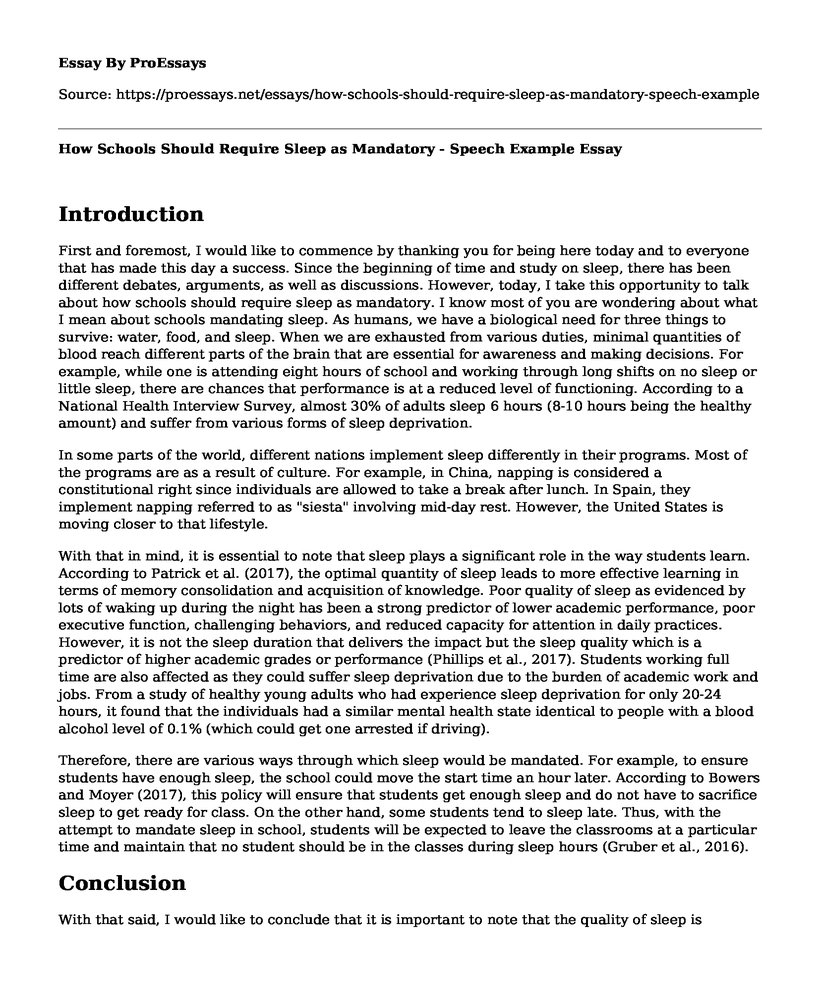Introduction
First and foremost, I would like to commence by thanking you for being here today and to everyone that has made this day a success. Since the beginning of time and study on sleep, there has been different debates, arguments, as well as discussions. However, today, I take this opportunity to talk about how schools should require sleep as mandatory. I know most of you are wondering about what I mean about schools mandating sleep. As humans, we have a biological need for three things to survive: water, food, and sleep. When we are exhausted from various duties, minimal quantities of blood reach different parts of the brain that are essential for awareness and making decisions. For example, while one is attending eight hours of school and working through long shifts on no sleep or little sleep, there are chances that performance is at a reduced level of functioning. According to a National Health Interview Survey, almost 30% of adults sleep 6 hours (8-10 hours being the healthy amount) and suffer from various forms of sleep deprivation.
In some parts of the world, different nations implement sleep differently in their programs. Most of the programs are as a result of culture. For example, in China, napping is considered a constitutional right since individuals are allowed to take a break after lunch. In Spain, they implement napping referred to as "siesta" involving mid-day rest. However, the United States is moving closer to that lifestyle.
With that in mind, it is essential to note that sleep plays a significant role in the way students learn. According to Patrick et al. (2017), the optimal quantity of sleep leads to more effective learning in terms of memory consolidation and acquisition of knowledge. Poor quality of sleep as evidenced by lots of waking up during the night has been a strong predictor of lower academic performance, poor executive function, challenging behaviors, and reduced capacity for attention in daily practices. However, it is not the sleep duration that delivers the impact but the sleep quality which is a predictor of higher academic grades or performance (Phillips et al., 2017). Students working full time are also affected as they could suffer sleep deprivation due to the burden of academic work and jobs. From a study of healthy young adults who had experience sleep deprivation for only 20-24 hours, it found that the individuals had a similar mental health state identical to people with a blood alcohol level of 0.1% (which could get one arrested if driving).
Therefore, there are various ways through which sleep would be mandated. For example, to ensure students have enough sleep, the school could move the start time an hour later. According to Bowers and Moyer (2017), this policy will ensure that students get enough sleep and do not have to sacrifice sleep to get ready for class. On the other hand, some students tend to sleep late. Thus, with the attempt to mandate sleep in school, students will be expected to leave the classrooms at a particular time and maintain that no student should be in the classes during sleep hours (Gruber et al., 2016).
Conclusion
With that said, I would like to conclude that it is important to note that the quality of sleep is essential for everyone and the community as a whole. As per The American Academy of Sleep Medicine (AASM), the following tips can help improve the quality of sleep; going to bed early, only use the bed for sleeping (not using the phone or reading), limit naps, avoid caffeine, eat healthy, adjust the lights before sleep, and set a proper sleeping schedule which involves waking up at a particular time. Therefore, pointing out how schools should require sleep as mandatory.
Works Cited
American Academy of Sleep Medicine. "College scholars: Getting enough sleep is necessary to academic success." (2007).
Bowers, Jennifer M., and Anne Moyer. "Effects of school start time on learners' sleep duration, daytime sleepiness, and attendance: a meta-analysis." Sleep Health 3.6 (2017): 423-431.
Gruber, Reut, et al. "School-based sleep education program improves sleep and academic performance of school-age children." Sleep Medicine 21 (2016): 93-100.
Patrick, Yusuf, et al. "Effects of sleep deprivation on cognitive and physical performance in university students." Sleep and biological rhythms 15.3 (2017): 217-225.
Phillips, Andrew JK, et al. "Irregular sleep/wake patterns are associated with poorer academic performance and delayed circadian and sleep/wake timing." Scientific reports 7.1 (2017): 3216.
Cite this page
How Schools Should Require Sleep as Mandatory - Speech Example. (2022, Dec 13). Retrieved from https://proessays.net/essays/how-schools-should-require-sleep-as-mandatory-speech-example
If you are the original author of this essay and no longer wish to have it published on the ProEssays website, please click below to request its removal:
- Strengths of the Kindergarten CCSS
- Lesson Plan and Grading Rubric for ELL
- Summary of the Teaching Plan Paper Example
- Article Analysis Essay on Children's Toys Should Be Gender Neutral
- Should School Require Uniforms? - Essay Sample
- Critical Thinking as the General Education Outcome
- Essay Example on Sports in High School: Social Significance & Cognitive Impact







